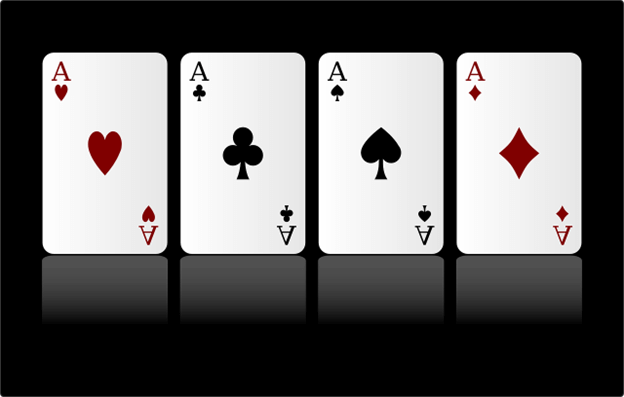Poker Cheat Sheet Betsquare

Are you an Aussie ready to dive into the world of poker? Our all-encompassing cheat sheet offers a head start for newcomers at the table. Learn about hand hierarchies that will enhance your strategic decisions and get to know the rules and rhythms of crowd favorites like Texas Hold’em and Omaha.
In addition to the fundamental game rules and betting strategies, we’ll highlight the significance of maintaining proper poker etiquette before wrapping up with a few advanced tips to propel you to the next level.
The Basics of Poker Hand Rankings
To excel at poker, understanding the strength of poker hands is crucial. Ideally, you’ll be consistently dealt top-ranking hands, enabling more aggressive betting and maximizing potential gains from the pot.
Yet, things won't always go your way. Identify which hands are inherently weaker, and by boosting your awareness of low-value poker hands, you can optimize your VPIP—Voluntarily Put In Pot.
This stat indicates how frequently you invest in the pot pre-flop. Maintain a moderate VPIP; a high rate might jeopardize your chip stack on weak hands.
The ideal VPIP ranges from 12%-24%, especially in classic Texas Hold’em or Omaha with nine-ten players. The figures might spike in heads-up or 6-max tables.
If you’re a visual learner needing a quick reference for poker hand rankings, our comprehensive table below can assist you:
| Number | Hand | Hand Description |
| #1 | Royal Flush | Royal Flush – The rarest hand in poker, a straight from ace to ten all in the same suit. |
| #2 | Straight Flush | Flush – Any sequence where all five cards share the same suit. |
| #3 | Four of a Kind | Four cards of the same value, i.e. K, K, K, K |
| #4 | Full House | Full House – A pair combined with three of the same kind. |
| #5 | Flush | Any five cards of the same suit |
| #6 | Straight | Straight – Five cards in consecutive order, not necessarily in the same suit. |
| #7 | Three-of-a-Kind | Three cards of the same value, i.e. J, J, J |
| #8 | Two Pair | Two pairs of matching cards, i.e. 10, 10, K, K |
| #9 | One Pair | One pair of matching cards, i.e. A, A |
| #10 | High Card | High Card – The best-ranked card in your hand when no pairs or higher combinations are present. |
Key Poker Rules and Game Setups
For those grappling with poker basics, allow us to delineate gameplay dynamics in the popular Texas Hold’em and Omaha poker variants. Texas Hold’em and Omaha.
Both versions feature a maximum of four betting rounds: pre-flop, the flop, the turn, and the river.
During each round, the betting options are identical: fold (discard your hand), check (progress for free), bet (start off betting), call (match a previous bet), or raise (increase the stake).
Here’s a detailed look into the mechanics of Texas Hold’em and Omaha games:
Texas Hold’em
- Start of a Hand: Each participant gets two personal (hole) cards.
- Gameplay Flow:
- Blinds: Two players initiate the betting with the small and big blinds.
- Pre-Flop: Following the hole cards, the player left of the big blind starts the betting round.
- Flop: Three community cards are unveiled face-up, inciting another betting round.
- Turn: A fourth community card emerges, initiating a new round of betting.
- River: A fifth community card appears, bringing the final betting round.
- Showdown: The remaining players show their hands, and the best five-card hand claims the pot.
Omaha
- Start of a Hand: In Omaha, each player is given four personal (hole) cards.
- Gameplay Flow:
- Blinds: Blinds are posted as in Hold’em, with small and big blind contributors.
- Pre-Flop: Here, participants receive four hole cards, initiating a betting round.
- Flop: Three community cards are unveiled face-up, inciting another betting round.
- Turn: As with Hold’em, the fourth community card triggers another betting round.
- River: A fifth community card appears, bringing the final betting round.
- Showdown: Players must utilize two of their hole cards with three community cards to form their best hand. The top hand wins.
Fundamental Poker Strategies
Starting out with poker requires a solid foundation in basic strategies to stabilize your playstyle. Below, we’ll share betting tips to guide your shift from novice to informed amateur.
Betting Tactics
- Value Betting
Over-betting will be discussed in detail, but you should always aim to extract optimal value from strong hands.
Suppose you have pocket aces and another ace lands in the flop. At this point, no one else can triumph with an ace set, putting you in a primary position. For less-experienced opponents, it's effective to show vulnerability to incite their response. Against astute players, ensure your bet entices them without scaring them off.
- Bluffing
Occasionally gamble or raise on a lesser hand to encourage opponents with stronger hands to fold. This tactic is best against inexperienced adversaries or those deterred by aggressive plays. However, be cautious with bluffs. most common poker terms in the trade.
Frequent bluffing undermines credibility. Play it wisely, or your bets won’t carry weight.
- Continuation Betting (C-Bet)
If you were the assertive bettor previous round, it can be advantageous to lead in the subsequent round, regardless of the board’s outcome.
This is termed a continuation bet, useful even when your hand shows no improvement. Consider it an opportunity to glean intel on your rivals’ hands.
Recognize the Impact of Table Position
Your seating affects your betting strategy. Being ‘in position,’ or among the last to fact, grants substantial insight into opponents’ strategies—informational gold that can shape your actions.
Opt for conservative play early on. Expand your hand range as the table shifts, notably when faced with vulnerable opponents.
Read Your Opponents
Assess your rivals, understanding their betting habits. Conservative players will fold more, making them predictable targets for bluffs. Liberally wagering players will often experiment with marginal hands, exposing themselves to value bets when you’re strong.
Essential Poker Decision-Making: Fold, Call, or Raise
- Fold
Have a weak starting hand? Fold it, unless you are convinced you can outsmart an opponent.
- Call
Call with a respectable hand if uncertainty persists about its standing. For instance, a middling pair and a modest bet from others gives a chance to proceed without major commitment.
- Raise
Confident in a superior hand, like top pair or kicker? Raise to squeeze value and tighten the competitor pool.
Mistakes to Avoid in Poker
A reliable poker guide should spotlight typical flaws in Aussie novices’ strategy habits. Now, let’s examine commonplace missteps and how keen beginners err at the table.
- Prepared to play any starting hand
Most newcomers can confirm it’s alluring to engage too heavily {-{i}-}too often{-{/i}-} . Impetuous calling or raising with hands that belong in the muck bloats disadvantageous variance in outcomes.
Limit the hands you play from an early role, loosening up in late stages when opponents show little power. - Shield your decisions from emotional sway
Poker can stir emotions, but succumbing to them spells trouble more often than triumph.
Mitigating irrational impulses, known as ‘tilt,’ involves acceptance of unexpected occurrences. Your foe might land a seemingly unlikely card. Analyze each hand without bias, setting aside recent results. - Over-aggressive betting
Routine for students is excessive betting minus merit. Referred to as ‘over-betting,’ novices growing excited with a steady hand unconquerable on subsequent rides shove peers away, squandering the hand’s promise.
To check over-betting, master pot odds and implied odds, aiding you to coordinate bet sizing proportionate to drawing or standing chances.
Poker Etiquette
Live poker rooms aren’t merely venues for competition; they’re melting pots for community engagement while adhering to careful conduct to heighten enjoyment and maintain environment quality.
- Pace of play
Ensure continuous play. Poker rounds can slow, hinging on player decisions. Swift, thorough strategies ensure a brisk flow.
- No trash talk
Award every adversary mutual respect, irrespective of skill level. Should someone win despite odds, resist critiquing their style.
Poker’s competitive nature can test mettle, yet maintaining amicability during tensions shields players from tilting after major losses.
- Manage your chip stack
Uphold organization and manage your chip stack efficiently. Avoid accidental exposure to safeguard the competitive integrity of the game.
- Stay present in the game.
Rule number four closely relates to rule number one. It's crucial to keep your focus sharp and stay involved with the game, even when you're not holding any cards. That means avoiding unnecessary distractions like scrolling through your phone or engaging in loud conversations with other players who are not part of the current hand. Being attentive and respectful emphasizes your seriousness about playing poker.
Advancing Your Poker Skills
If you're bitten by the poker bug and find yourself drawn to the nuances of the game, here are some advanced strategies to help you think more like someone who's moving past the beginner stages:
Master Pot Odds
Make it a practice not to toss your chips away carelessly. It's all about investing chips in a manner that aligns with your chances of success. Mastering 'pot odds' is essential here; it helps gauge the profitability of a call in terms of potential gain versus risk.
Consider a pot already holding $75 where your cost to call is $25, translating to pot odds of 3 to 1. This means you should only call if your likelihood of winning is at least 33.33%.
Exploit Player Tendencies
Players at an intermediate level pay a lot of attention to their opponents' behavior to adapt their tactics. You should observe and analyze how often others bet, call, or fold. Start categorizing them into types like tight-aggressive, tight-passive, loose-passive, and loose-aggressive to better strategize.
Embrace Bluffs and Semi-Bluffs
To bluff successfully, you should expand beyond bluffing with subpar hands. Integrate semi-bluffing into your playbook, such as wagering with hands that could improve as the board develops.
Learn about 'bluff equity', which marries the odds of persuading your opponent to fold with the value of your hand if they choose to call.
Conclusion
Hopefully, this cheat sheet will prove a valuable resource for mastering poker hand hierarchies, understanding different betting structures in popular poker styles, and grasping strategies necessary for honing your poker skills. As with everything else, regular practice is key to reaching poker perfection.
Ultimately, avoid trying to dabble in every poker format without mastering any. Determine if you enjoy cash games or tournaments more, and focus on perfecting those particular formats. Develop strong foundational poker abilities before advancing levels.
Don’t be afraid to engage with the online poker The online poker community is full of knowledgeable players ready to share insights and tips, including those from the team at Betsquare!






